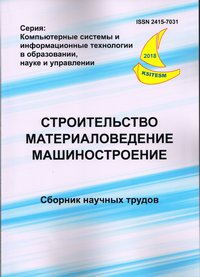Development of model of intellectual system of evaluation of professional qualities of abiturients
DOI:
https://doi.org/10.30838/P.CMM.2415.270818.31.226Keywords:
identification, professional skills, fuzzy neural networkAbstract
The question of choosing the direction and specialty of study becomes especially relevant at the stage of admission to a higher educational institution. In this paper, a decision support system is developed for entrants who cannot independently determine what they want to do in the future. Goal. The development of a model and algorithm for training an intellectual system for assessing the professional abilities of university entrants, which is designed to assess their ability to acquire knowledge and skills in a particular industry. Method. Increasing the level of automation of the process of assessing the professional abilities of the applicant in the light of natural properties, mental activity and requirements for the profile of a specialist is proposed to be implemented through the introduction of the process of self-actualization of the intellectual system. The basis of the system is the fuzzy neural network Takagi-Sugeno-Kang. The development of input and formalization of output data, as well as the creation of a knowledge base of the system at this stage is left to the experts. Results. The research of modern methods and means of identification of abilities and achievements of university entrants was conducted. The approach to the development of an intellectual system for assessing the professional abilities of applicants in the choice of the direction of training is proposed. The structure of the system is described, which is intended to assess the possibilities of applicants to the acquisition of knowledge, which are necessary for successful training in the chosen specialty. Scientific novelty. The input and output parameters of the Takagi-Sugeno-Kang neural network are investigated. The choice of the algorithm of network learning with the teacher is substantiated. The training algorithm is adapted to the decision of the task of assessing the applicant's ability to study in the specialties of the field of knowledge "Information Technologies". Minimization of error is proposed to use direct method of random search. Practical value. The model of the intellectual system of the estimation of professional abilities that is capable of processing the fuzzy data accumulated as a result of communication with the entrant is developed. Practical value from the introduction of such systems is based on the choice of profession, which provides an opportunity to increase competitiveness and improve the quality of the future life of young people. Further work will be aimed at developing fuzzy rules of withdrawalReferences
Кompleksna proforientactiina diagnostychna programa dlay starchoklasnykiv «Abiturient» [Integrated vocational guidance diagnostic program for high school students "Applicant"] http://cleverdia.com/index.php?lang=uk
Nаtsіоnаlnyi standart DSTU ISO 9001:2015 (ISO 9001:2015, IDT) Systemу upravlinniа yakistiu. Vymohi.[ National standard DSTU ISO 9001: 2015 (ISO 9001: 2015, IDT) Quality management systems. Requirements], Vydannia оfitsіine [Official publication], Кyiv, DP «UкrNDNTS», 2016 (in Ukrainian).
Pоstаnоvа kаbіnеtu Міnіstrіv Ukrainy vіd 1 lyutоgо 2017 r. No. 53 Кyiv «Prо zаtvеrdzhennia pеrеlіku gаluzei znаn і spеtsіаlnоstei, zа yakymy zdіisniuietsia pіdgоtоvkа zdоbuvachіv vyshchоi оsvіty» [Resolution of the Cabinet of Ministers of Ukraine dated February 1, 2017 No. 53 Kyiv "On approval of the list of branches of knowledge and specialties for which higher education graduates are trained"] Оfіtsіinyi vіsnyk Ukrаiny, [Official Gazette of Uk raine,], 2015, no. 38, pp. 1147; 2016, no. 79, pp. 2647 (in Ukrainian).
Tsіdylо І.М. Моdеl nеchіtkоi еkspеrtnоi systeмy prоgnоzuvаnia zміstu оsvіty [Model of fuzzy expert system of prediction of the content of education], Іnfоrмаtsіinі tеkgnоlоgіi і zаsоby nаvchаnnia [Information technologies and teaching aids], 2012, no. 6(32) (in Ukrainian).
Shеlоbаеv S.I. Маtемаtichеskiе меtоdy i моdеli v ekоnомikе, finаnsаkh, biznеsе [Mathematical methods and models in economics, finance, business] Мoscow, IUNIТI, 2001, 367 p. (in Russian).
Blum, C., Puchinger J., Raid, J.R. and Roli A. Hybrid metaheuristics in combinatorial optimization: A survey // Applied Soft Computing. – 2011, – 11, 6. – P. 4135-4151.
Osowski S. Sieci neuronowe do przetwarzania informacji. – Warszawa, 2000 – 342 p. (in Polish).
Tanaka, K., Yoshida, H, Ohtake, H., and Wang, H. O. A sum-of-squares approach to modeling and control of nonlinear dynamical systems with polynomial fuzzy systems. IEEE Transactions on Fuzzy systems, 2009, no.17(4), pp. 911-922
Zaitseva E. and Levashenko V. Importance Analysis by Logical Differential Calculus. Automation and Remout Control. Springer Publ. vol. 74, issue 2, 2013, pp. 171-182.
Downloads
Published
Issue
Section
License
Редакція Видання категорично засуджує прояви плагіату в статтях та вживає всіх можливих заходів для його недопущення. Плагіат розглядається як форма порушення авторських прав і наукової етики.
При виявлені у статті більш ніж 25% запозиченого тексту без відповідних посилань та використання лапок, стаття кваліфікується як така, що містить плагіат. У цьому випадку стаття більше не розглядається редакцією, а автор отримує перше попередження.
Автори, в статтях яких повторно виявлено плагіат, не зможуть публікуватися в усіх журналах Видавництва ДВНЗ «Придніпровська державна академія будівництва та архітектури».
Автори, які публікуються у цьому журналі, погоджуються з наступними умовами:
- Автори залишають за собою право на авторство своєї роботи та передають журналу право першої публікації цієї роботи на умовах ліцензії Creative Commons Attribution License, котра дозволяє іншим особам вільно розповсюджувати опубліковану роботу з обов'язковим посиланням на авторів оригінальної роботи та першу публікацію роботи у цьому журналі.
- Автори мають право укладати самостійні додаткові угоди щодо неексклюзивного розповсюдження роботи у тому вигляді, в якому вона була опублікована цим журналом (наприклад, розміщувати роботу в електронному сховищі установи або публікувати у складі монографії), за умови збереження посилання на першу публікацію роботи у цьому журналі.
- Політика журналу дозволяє і заохочує розміщення авторами в мережі Інтернет (наприклад, у сховищах установ або на особистих веб-сайтах) рукопису роботи, як до подання цього рукопису до редакції, так і під час його редакційного опрацювання, оскільки це сприяє виникненню продуктивної наукової дискусії та позитивно позначається на оперативності та динаміці цитування опублікованої роботи (див. The Effect of Open Access).

